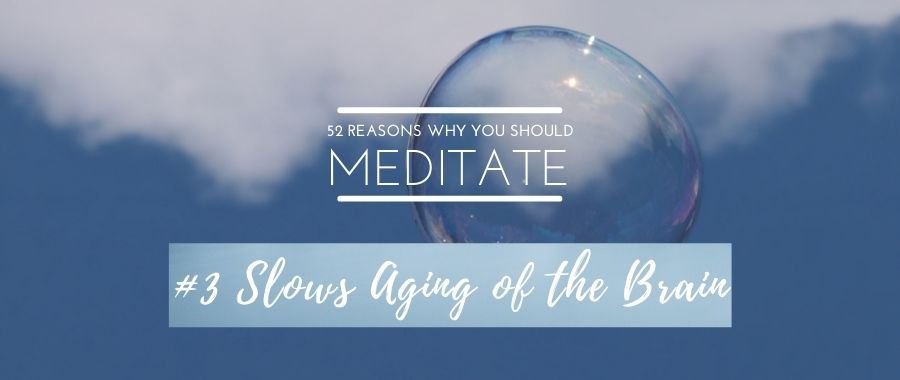Each week this year I shall be posting one Reason to Meditate .. with reference to some current research and my own practice (personal laboratory) so by the end of
I learned to meditate as a teenager .. so, from my own personal experience, I can confidently confirm that there are way more than 52 reasons why you should meditate!
52 REASONS WHY .. YOU SHOULD MEDITATE
There
#3 Slows Aging of the Brain
We all want a healthy brain .. and there is now a growing library of research in the field of neuroscience that has shown the brain can be positively impacted by the practice of meditation.
In one of her first studies (2006) Professor Sara Whitney Lazar, Assistant Professor of Psychology at Massachusetts General Hospital, and her
They found that the meditators had more gray matter in the area of the brain linked to decision-making and working memory: the frontal cortex. And while most people see their cortexes shrink as they age, 50-year-old meditators in the study had the same amount of gray matter as those half their age!
A later study involved a group of non-meditators who went through an 8-week meditation program (the MBSR program developed by Dr Jon Kabat-Zinn) and scans of their brains before, and after, showed growth in certain brain regions including:
the posterior singular cortex, the “number one region that goes in Alzheimer’s disease. It’s a very important part of the brain. It’s found to be involved in a lot of different processes, in particular its main thing seems to be about mind wandering and staying in the present moment, related to memory. And this is an area that seems to be improved by [meditation].”
the hippocampus, also “important for ageing, and Alzheimer’s and memory, and those two – the posterior singular cortex and hippocampus – work together. And so, this data has suggested [meditation] could potentially slow down or prevent those sorts of diseases.”
the amygdala the area of the brain associated with stress, anxiety and fear and research showed that it got smaller, with meditators reporting feeling less worried or hassled by their lives, even when their circumstances remained the same.
Just recently I read a study from the University of Wisconsin-Madison and Harvard Medical school that found evidence suggesting that meditating daily may slow brain aging.
The paper, published in the journal Neurocase, was the first study of its kind to exam brain scans of long-term meditators, with a comparison control group who don’t meditate as extensively, over multiple years (longitudinal study). The experienced meditator was a 41-year-old Buddhist Tibetan monk, Yongey Mingyur Rinpoche, who has meditated daily since he was aged 9.
In the study researchers used structural MRI to scan the brain of YMR four times over the course of 14 years, starting when he was 27 years old; alongside a control group of 105 adults, about the same age as YMR and from the Madison, Wisconsin area (so researchers would know what normal brain aging looked like). Using an AI system called the Brain Age Gap Estimation (BrainAge) that notes the structure of gray matter in the brain (which normally lessens in mass as a person ages) they estimated YMR’s age to be 33 – shaving 8 years of aging off his brain. This study adds to the growing body of research “that meditative practice may be associated with slowed biological aging.”
It raises the possibility that meditation practice
may slow the rate with which the brain ages
Richard Davidson
While I am unable to get a brain scan and cannot know how my own brain is aging, I am certainly excited about the potential for meditation to positively influence brain health and healthy aging. The traditional schools of meditation often refer to meditation as ‘mind-training’ and the hypothesis that mediation could be brain-protective and associated with reduced cognitive decline, and seeing the growing investment into research on how meditation may assist with mild cognitive impairment and Alzheimer’s disease, is fantastic and another inspiring reason to keep on meditating!
. . . . . . . . . . . . . . . . . . . . . . . . . . . . . . . . . . . . . . . .
‘BEING HERE NOW’ MINI-PRACTICE:
Start by settling into a comfortable seated position.
Close your eyes if that feels restful.
Start by just listening to the sounds around you. Notice and allow all sounds to come into your awareness, and then pass by. Try not to judge or engage with any sounds but simply listen for a minute or two.
Then, shift your attention to your whole body seated in the chair. Notice, how you have placed your body, your feet on the floor, your arms in your lap, your face soft. Find a point in your body that feels soft and at ease and rest your attention there for a minute or two.
Next, shift your attention to your hands and notice air circulating across your skin, or the touch of fabric or skin on skin. For a minute or two simply explore direct sensation in your hands .. throbbing, pulsing, pressure, coolness or warmth.
Finally, bring your attention to the feeling of your breath, your natural normal breath. How is your breath moving in this moment .. jumpy, slow, racing, heavy, or maybe floating? Wherever you notice your breath most deeply, find that place and rest your attention there for a minute or two.
If you get distracted simply notice and return your attention to your sense of hearing, your sense of the body, or your breath.
“My secret? I meditate!”
Sarah, Quiet Mind Meditation
If you would like to start meditating: I have some online options over HERE or email me hello@quietmind.com.au if you would like me to tailor a corporate session to suit your team.

